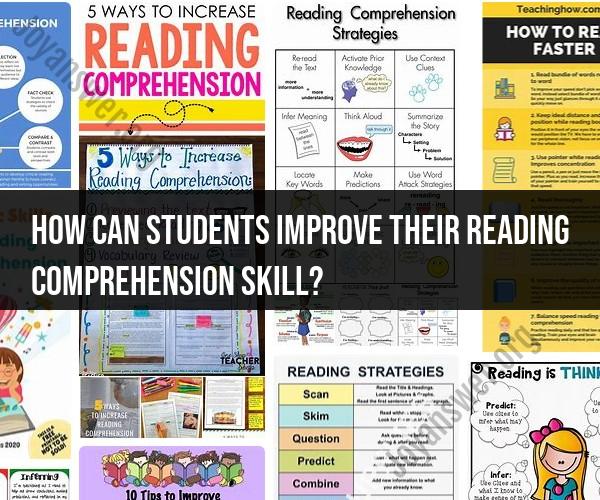How can students improve their reading comprehension skill?
Improving reading comprehension skills is essential for students to succeed academically and beyond. Here are some effective tips to help students elevate their reading comprehension skills:
Choose Varied Reading Material: Read a diverse range of materials, including newspapers, magazines, books, and online articles. This exposes you to different writing styles, topics, and perspectives.
Build a Strong Vocabulary: A robust vocabulary enhances your understanding of texts. Make a habit of learning new words and using them in context.
Preview the Text: Before reading, skim the text's headings, subheadings, and any visual aids. This helps you get an overview of the content.
Annotate and Take Notes: Underline or highlight important points, write summaries in the margins, and jot down questions or reflections as you read. These annotations aid in comprehension.
Identify the Main Idea: Determine the central point of each paragraph and the overall main idea of the passage. This forms the foundation of comprehension.
Focus on Structure: Recognize the structure of the text, including introductions, conclusions, and transitions. This helps you follow the author's argument or narrative.
Ask Questions: Formulate questions as you read to keep yourself engaged. This promotes active thinking and encourages you to seek answers in the text.
Predict Outcomes: Make predictions about what might happen next in a narrative or argument. This encourages critical thinking and keeps you engaged in the material.
Summarize: After reading a section or the entire passage, summarize the main points in your own words. This reinforces understanding.
Visualize: Create mental images of the events, concepts, or settings described in the text. Visualization enhances comprehension and retention.
Infer and Draw Conclusions: Pay attention to details and clues in the text to make inferences about characters, events, or the author's intentions.
Context Clues: Use context to decipher the meaning of unfamiliar words. Look at the surrounding words and sentences for hints.
Read Regularly: Consistent practice is key. Set aside time each day to read, even if it's just for a short period.
Discuss What You Read: Engage in discussions with peers, family, or teachers about what you're reading. Sharing perspectives can deepen your understanding.
Read Aloud: Reading aloud forces you to slow down and engage multiple senses. This can help you catch nuances and understand complex passages.
Reflect: After reading a text, take a moment to reflect on what you've learned, how it connects to your existing knowledge, and any questions it raises.
Challenge Yourself: Gradually tackle more complex materials as your skills improve. This helps you stretch your abilities and grow as a reader.
Stay Patient: Improving reading comprehension takes time and practice. Be patient with yourself and celebrate the progress you make.
Remember that everyone's pace of improvement is different. By consistently applying these tips and being an active and critical reader, you can enhance your reading comprehension skills and excel in your studies.













